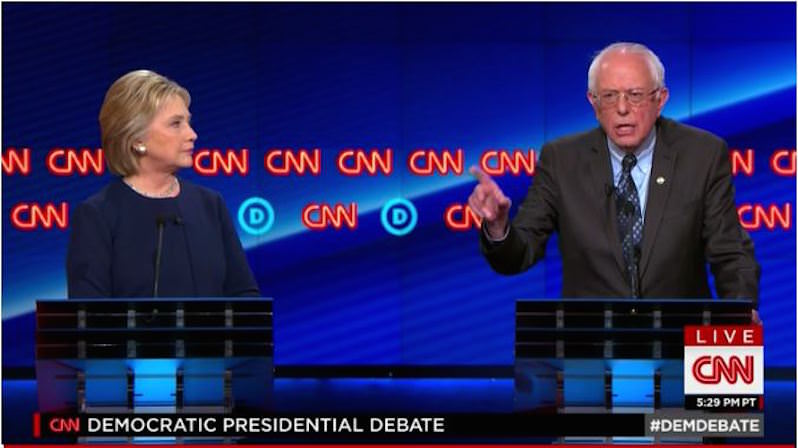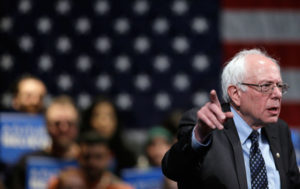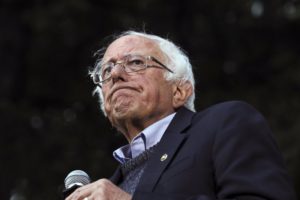Live Blog: Sparks Fly Between Sanders and Clinton in Flint Showdown (Updated)
Both the setting of Sunday night's Democratic debate in Flint, Mich., and the timing were significant. Update: The two Democratic presidential hopefuls' united front came tumbling down, and news broke that Sanders had won the Maine caucuses. CNN.com
CNN.com
CNN.com
7:03 p.m. PST: “We are here tonight in Flint, Mich., because a horrendous tragedy is taking place. But it’s not just in Flint, Mich.,” Bernie Sanders said in his closing statement. This reflected one of the key through-lines in this latest scrimmage between the two standing Dems: The local is national. Also: The country cannot hold without addressing the crumbling infrastructure and lifting up the struggling lower classes.
Fracking, public education, religion and a certain big, orange-hued elephant were all in the room during the scrappy debate’s final stretch. By the conclusion of their exchange, both Sanders and Hillary Clinton had made strong showings, and neither was likely to have gained too great an edge over the other.
Regarding fracking, Clinton may have protested too much, figuratively speaking, giving a wordy answer to whether she’d support the controversial energy-grabbing practice. “I don’t support it where any locality or any state is against it, number one,” she said. “I don’t support it where release of methane or contamination of water is present. … Unless we can require where anybody who fracks can tell us exactly what chemicals they use.”
Right. Wait, what? “I do not think there will be many places in America where fracking will continue to take place,” she said, slightly clarifying her stance.
Sanders’ bluntness served him well in his response to the fracking query. “My answer is a lot shorter. No, I do not support fracking,” he said.
The Vermont senator also jumped at the chance to play another card from his strong suit: public education. “I believe that every public college and university in this country should be tuition-free, so that your child, regardless of the income of your family, knows that if she studies hard, she is going to be able to go to college,” Sanders said.
Clinton and Sanders worked hard to refute the right-wing refrain about “godless liberals” in their reactions to a pious audience member’s request that they flash their spiritual credentials. Sanders said he believed God was “relevant,” as the questioner put it, and spoke of his pride in his Jewish background, which, combined with his family’s history of being persecuted during the Holocaust, helped him understand “what crazy and radical and extremist politics mean.”
Clinton said that if she hadn’t been connected to a higher power before spending time in the White House, she would have found religion under the roof of 1600 Pennsylvania Ave. “I pray for the will of God to be known so we can know it and to the best of our limited ability try to follow it,” she added.
Speaking of extremism, Donald Trump’s unholy name was raised in the debate’s final minutes. Naturally, Sanders and Clinton each claimed that he or she had a better chance of beating the Republican front-runner in the presidential polling booths.
“Donald Trump’s bigotry, his bullying, his bluster … are not going to wear well on the American people,” Clinton said, adding, “I will look forward to engaging him.”
Sanders shared Clinton’s confidence. “I would love to run against Donald Trump, and I’ll tell you why,” he said, claiming that “almost every poll has shown that Sanders versus Trump does a lot better than Clinton versus Trump.” (Is that so? Depends on whom, and when, you ask. For varying answers to that question, look here, here and here.)
When reminded about one of Trump’s go-to slams against Sanders—calling Sanders a “communist”—the self-described democratic socialist was ready with a wry retort: “That was one of the nice things he said about me.” * * *
6:32 p.m. PST: With the niceties out of the way, the next half-hour consisted of tussles over issues such as gun control, income inequality, racial injustice and mass incarceration. In engaging those hot-button topics, as well as each other, Sanders and Clinton each attempted to step forward as the more enlightened option to represent African-American voters—rather than being as yet another white politician claiming to feel others’ pain while lining their own pockets.
But here we must pause to note that Sanders won Sunday’s caucuses in Maine. From The Guardian’s coverage:
Bernie Sanders won the Maine Democratic caucuses on Sunday, his fifth victory in a caucus state, following wins in Nebraska and Kansas on Saturday.
With 77.5% of results counted, the leftwing Vermont senator had 64.2% of the vote to the former secretary of state’s 35.6%.
“With another double-digit victory, we have now won by wide margins in states from New England to the Rocky Mountains and from the Midwest to the Great Plains,” said Sanders in a statement put out by his campaign while he faced Clinton in a debate in Flint, Michigan.
Meanwhile, GOP candidate Marco Rubio prevailed in Puerto Rico.
But back to our regularly scheduled programming: CNN’s Don Lemon posed racially oriented questions to the candidates, asking them to account for their own blind spots and describe what they have done—and will do—for the cause of social justice.
Both acknowledged that they couldn’t claim to fully understand racism from self-reference alone. “I know I have never had the experience that so many people in America and this audience have had,” Clinton said.
Sanders seconded her sentiments. Pointing to his activism during the civil rights movement, he pledged, “We will end institutional racism.”
Clinton found herself in the hot seat when her husband’s legislative past on the subject of criminal justice came back to haunt her as potential indicators of her own likely moves on that front. “Why should black people trust you this time to get it right?” Lemon asked.
Clinton acknowledged that the 1990s criminal justice bill that President Clinton signed added to the country’s deplorable mass incarceration emergency.
Now that she knows better, she said, she would “go after systemic racism that stalks the criminal justice system, ending private prisons, ending the incarceration of low-level offenders.”
And spotting a chance to pull her rival into the fray, she asked, “Well, Sen. Sanders supported [the Clinton bill] as well. Are you going to ask him the question?”
Sanders answered for his own past by saying that the bill represented an instance in which “bad stuff and good stuff” coexisted in the same piece of legislation. “I have been a fierce fighter of domestic violence. … It was in that bill. The ban on assault weapons, what I’ve fought for my whole life, it was in that bill. … I tried to get the death penalty aspects in that bill out. Secretary Clinton and I disagree on that. I was then and I am now opposed to the death penalty.”
Judging by the audience’s response, that was a good countermove. * * *
5:55 p.m. PST: And then, the two Democratic presidential hopefuls’ united front came tumbling down. More accurately, Sanders took a jackhammer to it somewhere around the 25-minute mark.
Clearly determined to point out how his record differs sharply from Clinton’s, Sanders assumed an antagonistic stance and maintained it as he took her to task repeatedly, starting with her support of a series of “disastrous trade agreements written by corporate America.” Meanwhile, he said, “I was on a picket line in the early 1990s against NAFTA.”
Clinton pivoted and drew upon a potential strength from her own collection of legislative greatest hits, playing up a moment sure to resonate with the local community. “I voted to save the auto industry,” she said, adding that Sanders voted against it.
“If you are talking about the Wall Street bailout, in which all your friends destroyed the economy …” Sanders shot back, insinuating that Clinton was too close to financial leaders to hold them accountable. By contrast, he said, “Ultimately if you look at our records, I stood up against corporate America time and time again.”
Collecting herself to counter Sanders’ first attack about trade agreements, Clinton recast her changed position on the Trans-Pacific Partnership as the product of careful consideration rather than an outright flip-flop. “I thought it was reasonable to actually see what was in it before I opposed it. I opposed it,” she said.
As for supporting the 2008 bailout, well, that was also for the greater good, Clinton claimed. Had she not thrown in with the bailout effort, she said, “I believe the auto industry would have collapsed, taking 4 million jobs with it.”
That didn’t scan for Sanders. “I believe that the recklessness, the greed and the illegal behavior threw this country into the worst economic downturn in the modern history of the United States of America,” he retorted. “And I will be damned if it was the working people of this country who have to bail out the crooks on Wall Street.” The crowd took that one well.
Taking the audience reception as his cue to keep after Clinton, Sanders pointed out how one of them (guess who?) had a super PAC, and one had given speeches on Wall Street for large sums of money. Must be a “great speech,” he added. “I think we should release it.”
Clinton was in a corner, but as she has before, she positioned herself as someone who might seem to do the wrong thing in the moment but is right in the long run. “I’ll be happy to release whatever I have as long as everybody else does, too,” she said, saying that the real question is whether she can stand up to Wall Street.
And in another clever moment of revision, Clinton insinuated that it was exactly her close proximity to Wall Street that uniquely equipped her to take its leaders to task. “I told them they were wrecking the economy,” she said.
Sanders wasn’t buying her sales pitch, and he dialed up the contrast again in a theatrical gesture showing how much he had been paid for his own pro-Wall Street speechifying. “I release it—it ain’t nothin’!” he said. Clinton laughed. * * *
5:39 p.m. PST: Sanders and Clinton made the most of the backdrop, and the moment, as they played up—or ginned up—their populist credentials in light of the Flint water crisis.
The debate started on a note of solidarity, as both candidates agreed that Michigan Gov. Rick Snyder should be forced to resign. CNN debate moderator Anderson Cooper pointed out that the stance represented a new development on Clinton’s part.
Sanders declared that the lead poisoning catastrophe and the toll it took on Flint citizens “literally shattered me and was beyond belief.” Drawing links to the bigger picture, Sanders added that “what is happening in Flint is happening throughout this country.”
“I’ll start by saying amen to that,” Clinton chimed in, helpfully informing the audience that it was her idea to hold the latest Democratic presidential faceoff in the beleaguered Michigan city. Getting down to specifics, she told concerned citizens in attendance that “the state is derelict in not coming forward with the money that’s required,” and that, as president, she would make sure remedies to the water crisis were “triple-checked to regain your trust.”
As for what he’d do for Flint from the Oval Office, Sanders summed up his plan succinctly: If local representatives and agencies fail to take charge, “Federal government comes in, federal government acts.” Pulling a dose of chutzpah from his activist past, Sanders went further, suggesting that Flint residents should not be on the hook to pay their water bill—which recently amounted to three times more, he said, than what he pays for water service in Burlington, Vt.—for “poisoned water.”
As for who should be on the hook, Sanders spoke plainly: “President Sanders would fire anybody who knew what was happening and did not act appropriately,” he said. Contrasting the neglect of America’s infrastructure with bloated defense spending, Sanders called for “changing our national priorities” in Washington and on Wall Street. To another Flint resident who wondered what took politicians so long to wise up and show up to talk solutions, Sanders said, “I will make a personal promise to you that the EPA … will make sure that every water system in the U.S. is tested” and that the people know the quality of the water that they’re drinking. * * *
Both the setting of Sunday night’s Democratic debate in Flint, Mich., and the timing were significant. The city is in the midst of a major public health and governmental crisis, and Super Tuesday was just five days before.
The seventh confrontation between Clinton and Sanders also took place a day after Sanders emerged victorious in two state primaries and Clinton picked up one win.
Earlier Sunday, news broke that former first lady Nancy Reagan had died—an end-of-an-era event commemorated by Cooper and observed with a moment of silence at the opening of the debate.
Host network CNN also pointed out the auspicious timing of Sunday’s debate:
Their showdown comes a day after Sanders pulled off morale-boosting Super Saturday victories in caucuses in Kansas and Nebraska, doubling up on Clinton, who won one matchup—the Louisiana primary.
Yet such is the math of the presidential nominating process that Clinton won 57 pledged delegates to the 50 hauled in by Sanders, and so extended her lead in the overall Democratic presidential race.
The rivals also face off Sunday in Democratic caucuses in Maine, where polls will close just as they step onto the debate stage.
Before his encounter with Clinton, Sanders drew upon Saturday’s wins in an effort to build momentum in the next phase of his campaign.
Once again, we’ll be updating this live blog throughout the debate.
—Posted by Kasia Anderson
Your support matters…Independent journalism is under threat and overshadowed by heavily funded mainstream media.
You can help level the playing field. Become a member.
Your tax-deductible contribution keeps us digging beneath the headlines to give you thought-provoking, investigative reporting and analysis that unearths what's really happening- without compromise.
Give today to support our courageous, independent journalists.






You need to be a supporter to comment.
There are currently no responses to this article.
Be the first to respond.